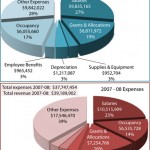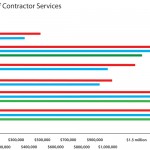By Kimberly Manahan (Story Editor)
The rising prices of utilities and other expenses have been impacting students’ tuition.
The 4 percent increase in tuition this year is mostly because of inflation, said Eric Nelson, vice president of finance.
Other factors that contributed to the rise in tuition include increases in salaries and contract services.
Last year faculty and staff salaries were said to be frozen this year.
“We held off making an announcement about pay increase until early October,†Nelson said. “We were uncertain of how the economy would affect enrollment.â€
Increases are retroactive to July 1, 2009.
The amount of students also affects the school’s budget.
“The increases are due to the cost of teaching and providing them living and board accommodations,†Nelson said.
With increasing enrollment, Wesley has had to hire additional faculty, staff and contract workers.
In 2005, 135 employees were reported on the IRS 990 form. The following year that number rose to 162.
Also that year, a staff was hired to work admissions at the New Castle Campus.
This year no additional full time staff has been hired.
Any openings are being covered by overload and part-time people, Nelson said.
Cost of living is also rising.
In the last year, the price of utilities has skyrocketed, Nelson said.
The money the school gives to the City of Dover, which provides water and electric, rose from $912,396 in 2006 to $1,289,686 in 2007.
The September bill paid to Dover totaled more than $110,000, Nelson said.
In 2006, the monthly cost paid to the electric company averaged $76,033.
Chesapeake Utilities, which provides gas, has gone up, but not as significantly.
In 2006, Chesapeake was paid $364,563 by Wesley, and the following year was $474,129.
The money paid to contract services such as Aramark has also increased over the past few years. In 2005, Aramark food services were compensated $1,990,840. A year later this rose to $2,097,062. Nelson said the increase was explained by including 190 people because of the addition of Malmberg Hall.
On the IRS 990 form obtained from guidestar.com, the total compensation for 2005 to Aramark as listed as $199,840.
This was a typo, Nelson said, that has not yet been updated on the Web site.
Meal plan prices have also gone up due to the increase in the cost of food and of the gas to transport it.
The amount compensated to Blue Cross Blue Shield of Delaware, which provides insurance, rose from $985,887 in 2005 to almost $1.6 million in 2006.
*Other expenses include: travel and conferences; printing and publications; pension plans; payroll taxes; accounting and legal fees; telephone; postage and shipping.




